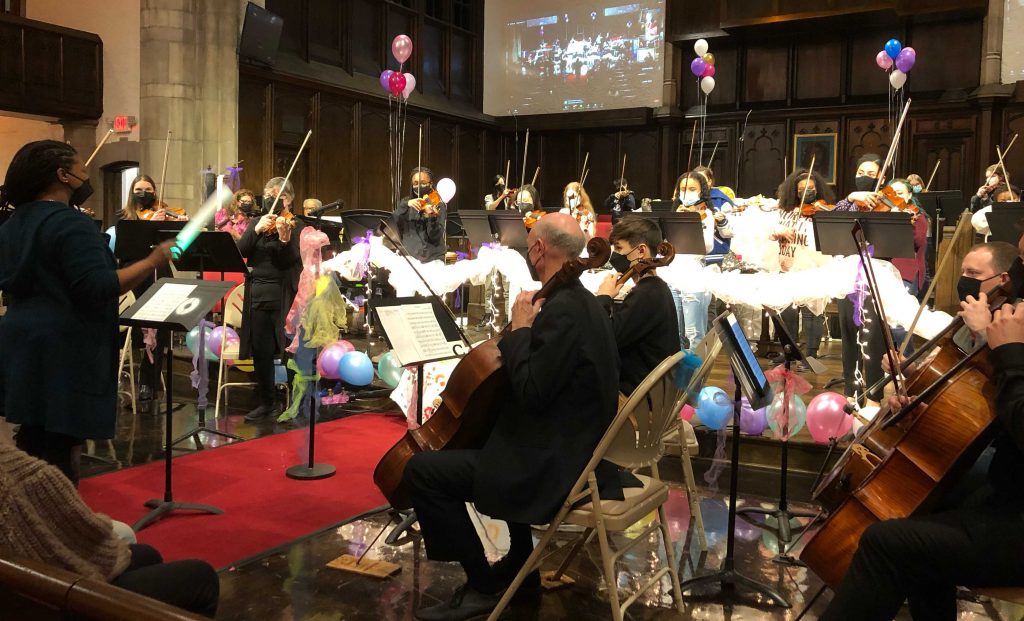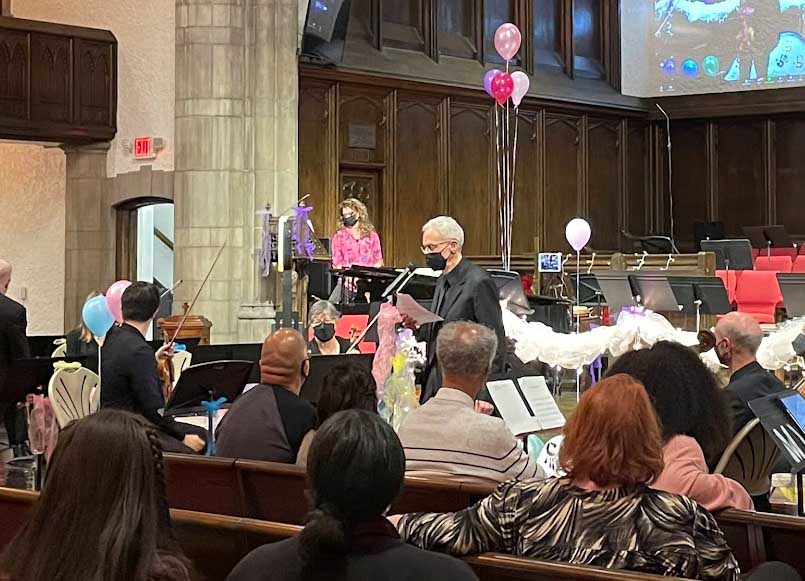Celebrating MYO Icon Betty Perry
The Musicians of the Indianapolis Symphony participated in a celebration honoring Betty Perry, founder of the Metropolitan Youth Orchestra, on January 26, 2022 at Broadway United Methodist Church. Betty has influenced generations of students through her holistic approach to learning a stringed instrument, and we are honored to have participated in her celebration.

Born and raised in the Bronx, Betty spent years in and out of orphanages and foster homes until her grandmother took her in (along with her two brothers). Because of her good grades, Betty was offered the opportunity to study music in a scholarship program. From the time she picked up the viola, Betty knew that music would be a part of the rest of her life. In fact it was Handel’s Water Music that inspired her to play the viola, as she describes:
I grew up in a home that didn’t have any male representation, and that’s pretty much been a storyline in my family. There are children and mothers but no representation of fathers. And so the inclination was to gravitate towards something that simulated [that male influence] in the family.
I was exposed to music in the public schools, and my music teacher realized that I had some musical talent. He was very pushy, and he insisted that I go hear the Bronx All-Borough youth orchestra. He wasn’t taking no for an answer. I had to get up and be ready at 7 o’clock, and I told him I wasn’t getting up that early for anybody. But he put his finger in my face and said “you’re gonna get up and you’re gonna be ready.”
So I went with a girl who was a member of this orchestra, and they got up on stage, all the kids from the 7th grade to the 9th grade warming up on stage and having fun. Then this little short woman got on the stage and everybody got quiet, and they broke out into Handel’s Water Music.
I don’t know what overcame me, but I started to cry, and I remember saying to myself that I was going to have music in my life, always, because of that piece.
I was very grateful at the celebration for that piece. It just shows me that what happened to me as a young girl gave me the ability to use that gift to help others to realize their dreams.
Greg Dugan shared memories of several ISO musicians as they recalled working with Betty over the years before a group of ISO musicians performed excerpts from Handel’s Water Music. A group of current and former students of Betty’s then joined to play the MYO signature piece, Stand By Me.

Years after moving to Indiana to be near her mother-in-law, Betty Perry started a music program of her own that would include children of diverse economic and ethnic backgrounds. She raised money for instruments and enlisted parents to conduct weekly group sessions and commit to daily practice at home. Betty used the common language of music to inspire and educate children. This was the beginning of the Metropolitan Youth Orchestra.
In 1995 The Children’s Museum incorporated MYO and in 2008 it became affiliated with the ISO. Many ISO members have taught under Betty’s direction at MYO and Betty’s influence on them has been just as profound. “Betty has always believed in educating the whole student and I have come to know that her dynamic works on parents and teachers too” remarks ISO violinist Lisa Scott. “Betty opened my eyes to teaching. I learned the totality of being an instructor, mentor and friend to my students” says violist Susan Chan.
MYO has a 100% graduation rate and many students earn scholarships for post secondary education. Betty’s impact on the organization, its students, and the classical music community in Indianapolis has been impossible to measure, and we are grateful for her dedication.

Finally, Betty suggests that anyone interested read the story of opera singer Ryan Speedo Green in the book Sing for Your Life: A Story of Race, Music, and Family by Daniel Bergner. From Betty: “This book gives us a glimpse of an underserved, disenfranchised community, of what they’re going through, and the genius we are missing. Music is a pathway to open doors, and gives us ideas on how to communicate with another culture.”
As we continue to try to communicate more widely with historically overlooked cultures and communities we must always look to do it wholeheartedly. This requires us to be respectful, impactful, and sustainable, but to also approach this communication with humility and honesty. We are grateful for Betty’s guidance and example, and look forward to bringing her spirit into our engagement with a wider, more diverse audience.